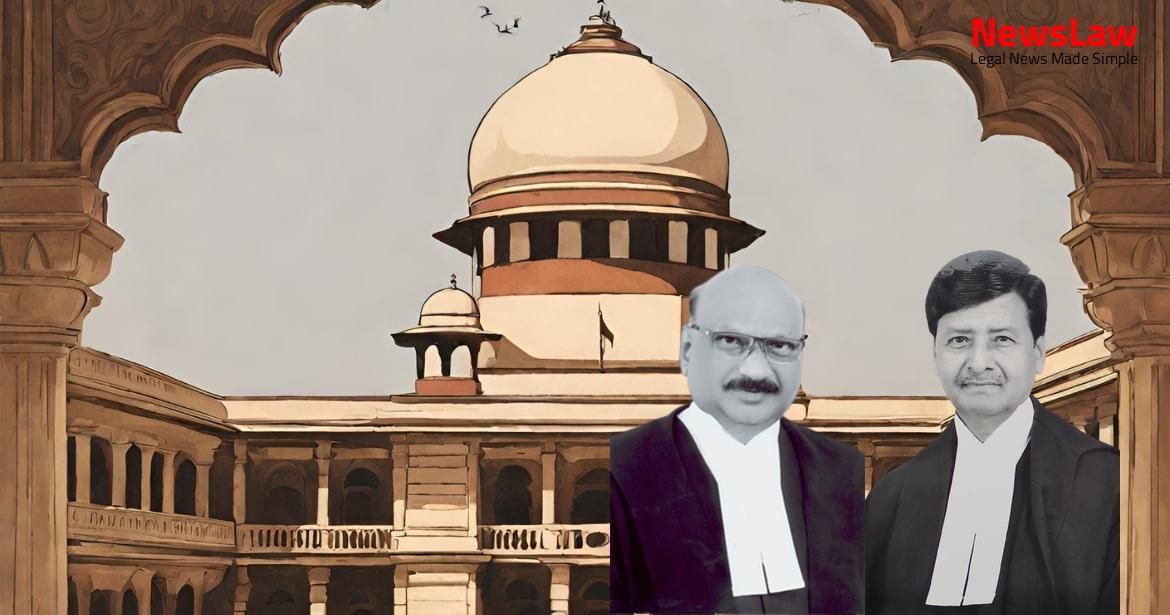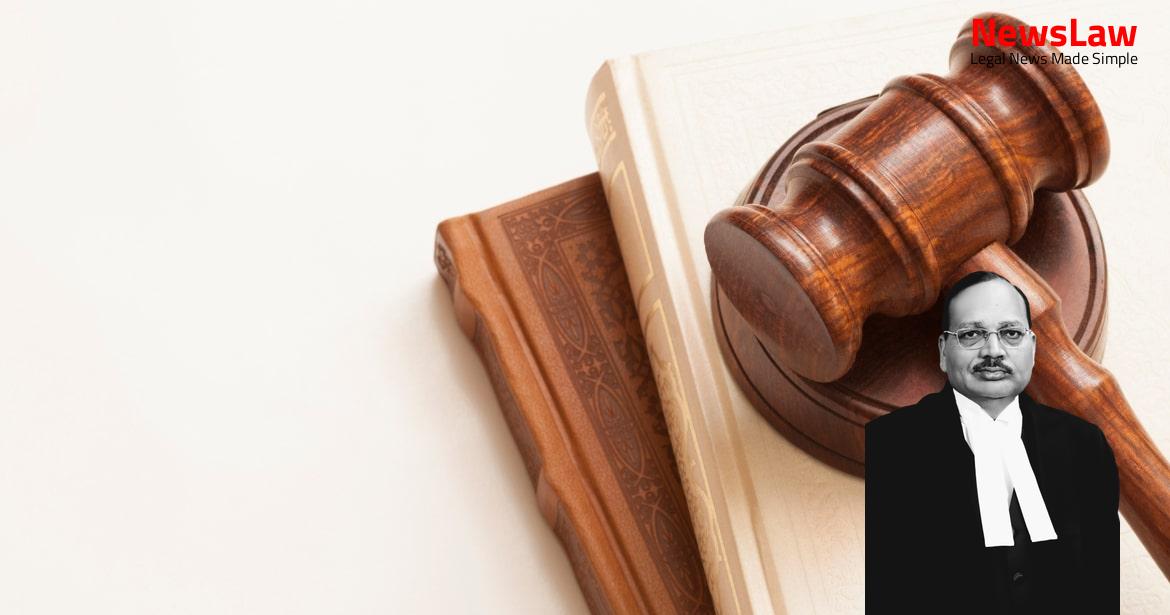In a recent landmark judgment by the Supreme Court of India, the Court delved into the complexities of arbitration limitation issues. The case involved a dispute between the parties, revolving around the applicability of the 1940 Act or the 1996 Act in arbitration proceedings. The Court’s decision sheds light on crucial aspects of limitation in arbitration, setting a legal precedent for future cases.
Facts
- Appellant approached Settlement Committee for outstanding payment on 4.10.1997.
- Settlement Committee failed to respond to representations.
- Respondent acknowledged pending consideration on 20.11.1997.
- Appellant sent final communication for payment on 5.10.2002 and 10.10.2002.
- Respondent requested details of bills for verification on 17/18.12.1999.
- Appellant replied with processed bills on 6.1.2000.
- Appellant requested appointment of arbitrator on 22.11.2002.
- Respondent did not appoint arbitrator within stipulated 30 days.
- Appellant filed Arbitration Applications for appointment of arbitrator.
- High Court dismissed the Arbitration Applications.
- Appellant failed to establish a case of hardship or injustice justifying condonation of delay in filing the applications under Section 43(3) of the 1996 Act.
- Arbitration Applications were deemed hopelessly barred by limitation.
- High Court accepted respondent’s argument that appellant raised the final bill in 1983 but failed to refer the dispute to the Chairman as per the arbitration clause, requesting an arbitrator in 2002.
- The contracts specified arbitrator appointment under The Arbitration Act, 1940, not the 1996 Act.
- Appellant’s request for arbitration in 2002 seemed like a mere attempt to pursue a monetary claim without a genuine dispute.
Also Read: Tower Infotech Ltd. Bail Order Appeal
Arguments
- Learned counsel for the appellant argued that the cause of action for the Arbitration Applications did not arise in 1983 or 1989, but in the letters dated 17/18.12.1999 where the respondents repudiated the appellant’s claims.
- The period before 18.12.1999 during which the parties were negotiating and corresponding should not be considered when computing the limitation period.
- The delay in responding to the representations by the appellant led to the delay in filing the Arbitration Applications.
- The Arbitration Applications are not time-barred due to the respondent’s delay in responding to the claims.
- Counsel relied on various Court decisions to support his contention.
- The first consideration before deciding the limitation issue is to determine whether the 1940 Act or the 1996 Act applies to the Arbitration Applications.
Also Read: Priority of Employees’ Dues in Asset Sale: SARFAESI Act vs. Land Revenue Code
Analysis
- Section 43(1) of the 1996 Act applies the Limitation Act, 1963 to arbitrations similar to court proceedings.
- Section 43(3) of the 1996 Act allows the court to extend the time to commence arbitral proceedings if undue hardship would be caused, even if the fixed time has expired.
- Article 137 of the First Schedule to the Limitation Act, 1963 sets the limitation period for arbitration disputes under both the 1940 Act and the 1996 Act.
- The three contracts in question had a common arbitration clause stating that disputes shall be referred to the Chairman, Rajasthan State Electricity Board, Jaipur or a person appointed by him as arbitrator.
- Section 85(1) of the 1996 Act repeals the Arbitration (Protocol and Convention) Act, 1937, the Arbitration Act, 1940, and the Foreign Awards (Recognition and Enforcement) Act, 1961.
- Section 21 of the 1996 Act specifies that arbitral proceedings begin when a request for the dispute to be referred to arbitration is received by the respondent.
- The decision in Sunder Kukreja is on different facts and inapplicable to present circumstances.
- Limitation period for arbitration invocation is three years from the cause of action under Article 137 of the Limitation Act, 1963.
- Claim bar by limitation if not filed within the specified period.
- Existence of dispute is essential for appointment of an arbitrator.
- Negotiations for amicable settlement may exclude time for limitation calculation under the 1996 Act.
- Failure to provide negotiation history between parties can lead to a finding against the applicant.
- Defaulting party delaying arbitration cannot claim undue hardship or sufficient cause for delay.
- Mere correspondence post a certain point does not extend the limitation period.
- Commercial disputes have a lower threshold for commencement of limitation period compared to family disputes.
- Dispute arises when one party asserts a claim and the other denies it.
- Key date determining cause of action is the ‘breaking point’ after negotiations cease and arbitration is pursued.
- Partnership deed and retirement deed issues do not impact the limitation question.
- Parties in an arbitration agreement cannot restrict the period for raising a claim as per Section 28 of the Indian Contract Act, 1872.
- Date of commencement of arbitration proceedings for deciding which Act applies is the date on which notice was served to the other party requesting appointment of an arbitrator.
- 1996 Act is deemed effective from 25.1.1996 when the Arbitration and Conciliation Ordinance, 1996 came into force.
- If the date of notice was prior to 25.1.1996, the 1940 Act will apply.
- Arbitrators must decide disputes according to the existing law of contract in mercantile references.
- Plea of limitation is open for arbitrator’s decision just like in court of law.
- Period of limitation for commencement of arbitration runs from the date the cause of arbitration accrued.
- Claim is ‘hopelessly barred’ by limitation if delayed for more than 10 years.
- Delay due to respondent’s failure to finalize bills extends the period to apply for arbitration.
- Claim accrues from the date the final bill was raised.
- Arbitration can be brought at any time if there is a reference clause in the contract.
- 1996 Act will apply to arbitral proceedings if notice was on or after 25.1.1996 even if the arbitration clause referred to the 1940 Act.
- Not all hardship is ‘undue hardship’ and hardship caused by one’s own default may not be transferred to the other party.
Also Read: Landmark Judgement on Consumer Rights in Healthcare Sector
Case Title: M/S GEO MILLER & CO.PVT.LTD. Vs. CHAIRMAN, RAJASTHAN VIDYUT UTPADAN NIGAM LTD.
Case Number: C.A. No.-000967-000967 / 2010



